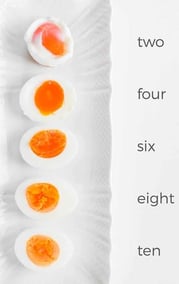How To Boil Eggs
We’ve all heard the joke about someone who can’t cook. “They can’t even boil an egg!” Well, we’ve got news for you – boiling an egg is far more of a science than you’d think. Sure, the concept is simply – eggs, a pan, boiling water. But if you want them done just so, there’s a little more to it than that.
First, the eggs themselves. Free range and organic is best, and they should also be super fresh. Choose a pan according to how many you wish to cook – the eggs shouldn’t be crowded, and they should be in a single layer – if you need to cook more, do them in batches. Fill the pan with fresh, cold water from the tap, covering the eggs by 3 cm, and add a pinch or two of salt – and old trick that helps peel the egg once it’s cooked. Put the pan on a high heat until the water reaches a rolling boil.
 Once boiling, turn off the heat, put a lid on, and leave to sit on the stove. Now, how long you leave it depends on how well done you’d like your eggs (which can often depend on what you’re cooking them for). For a super runny yolk, leave them 4 minutes; for a soft yolk, 6 minutes. 8 minutes will give you a tender yet firm yolk, and by 10 minutes and above, you’re into the realm of hard boiled (for example if you’re adding them to a salad, or making devilled eggs).
Once boiling, turn off the heat, put a lid on, and leave to sit on the stove. Now, how long you leave it depends on how well done you’d like your eggs (which can often depend on what you’re cooking them for). For a super runny yolk, leave them 4 minutes; for a soft yolk, 6 minutes. 8 minutes will give you a tender yet firm yolk, and by 10 minutes and above, you’re into the realm of hard boiled (for example if you’re adding them to a salad, or making devilled eggs).Once you’ve reached your desired time, transfer the eggs immediately to ice cold water (this stops the cooking process). When they’re cool to the touch, you can crack and peel the shell, and enjoy your perfectly boiled egg.
Simples, right? Unfortunately, not quite. A lot of people find the only way to get eggs that you’re happy with is through a certain amount of trial and error, for there are many variables. For example, the bigger the egg, the longer it will take to cook to your desired consistency. Also, an egg straight out of the fridge will cook slower than one at room temperature.
The power of your stove, and how quickly it can boil the water, is another factor to consider, as is the altitude – yes, really – of where you live. The boiling temperature of water falls as altitude rises, so if you live in Denver, or Sante Fe, you’re going to need to adjust those times somewhat.
So grab a pan, some eggs from our great selection, and get boiling. Just remember – a perfectly boiled egg is the mark of someone who really knows what they're doing in the kitchen.

